Organisational Behaviour: Analysing Culture and Motivation
VerifiedAdded on 2023/06/18
|13
|4454
|417
Report
AI Summary
This report provides a comprehensive analysis of organisational behaviour, focusing on how company culture, politics, and power influence individual and team behaviour and performance, using Iceland Foods Limited as a case study. It examines the impact of Handy's culture model (Power, Task, Person, Role) and French and Raven's power model (Coercion, Reward, Legitimate) on organisational dynamics. The report further explores content and process theories of motivation, including Maslow's hierarchy of needs and Herzberg's motivation theory, to understand how motivational techniques enable effective goal achievement. Additionally, it discusses the characteristics of effective versus ineffective teams and applies organisational behaviour concepts and philosophies within a given business situation, highlighting the relevance of team development theories in influencing workplace behaviour. The analysis aims to provide justified recommendations for fostering a positive and productive organisational environment.
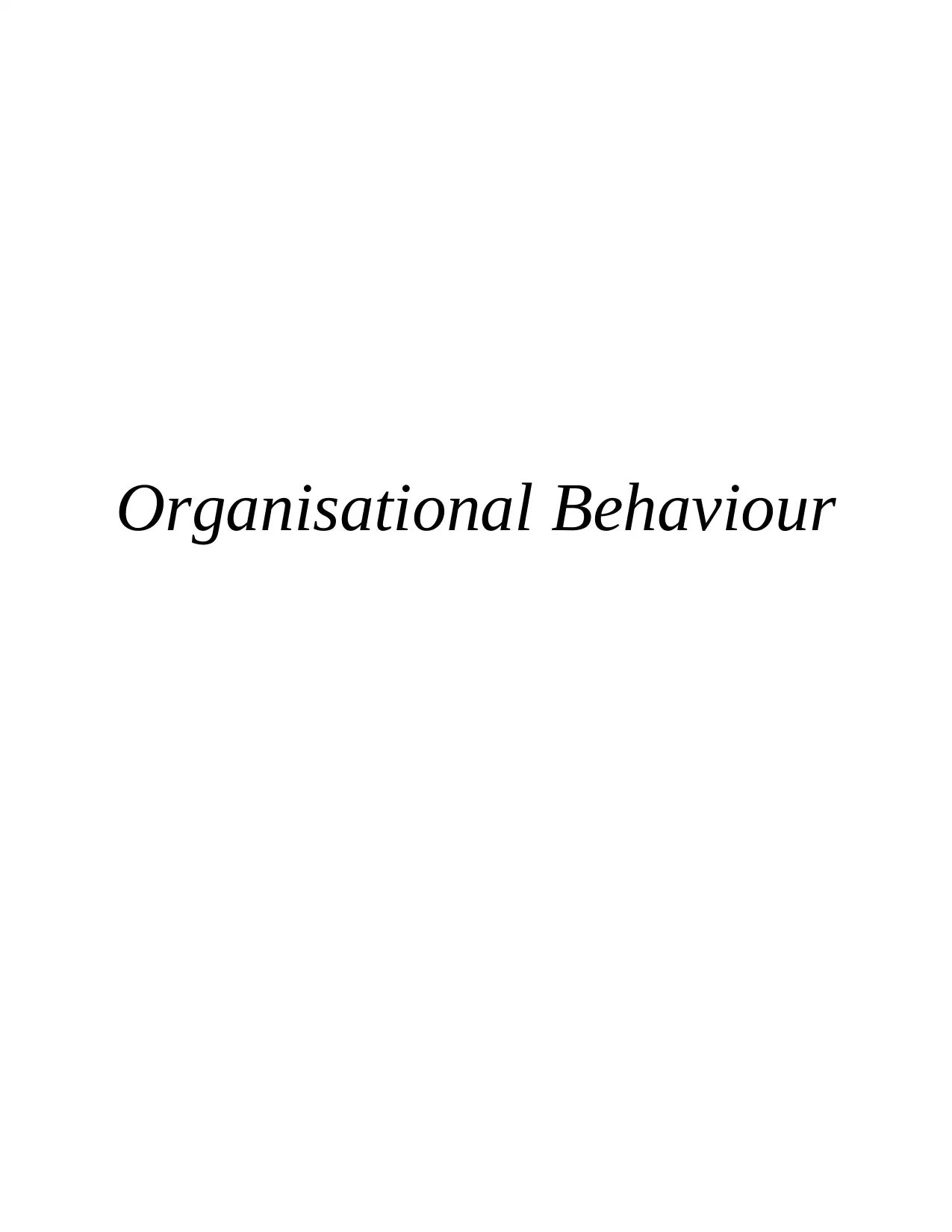
Organisational Behaviour
Paraphrase This Document
Need a fresh take? Get an instant paraphrase of this document with our AI Paraphraser
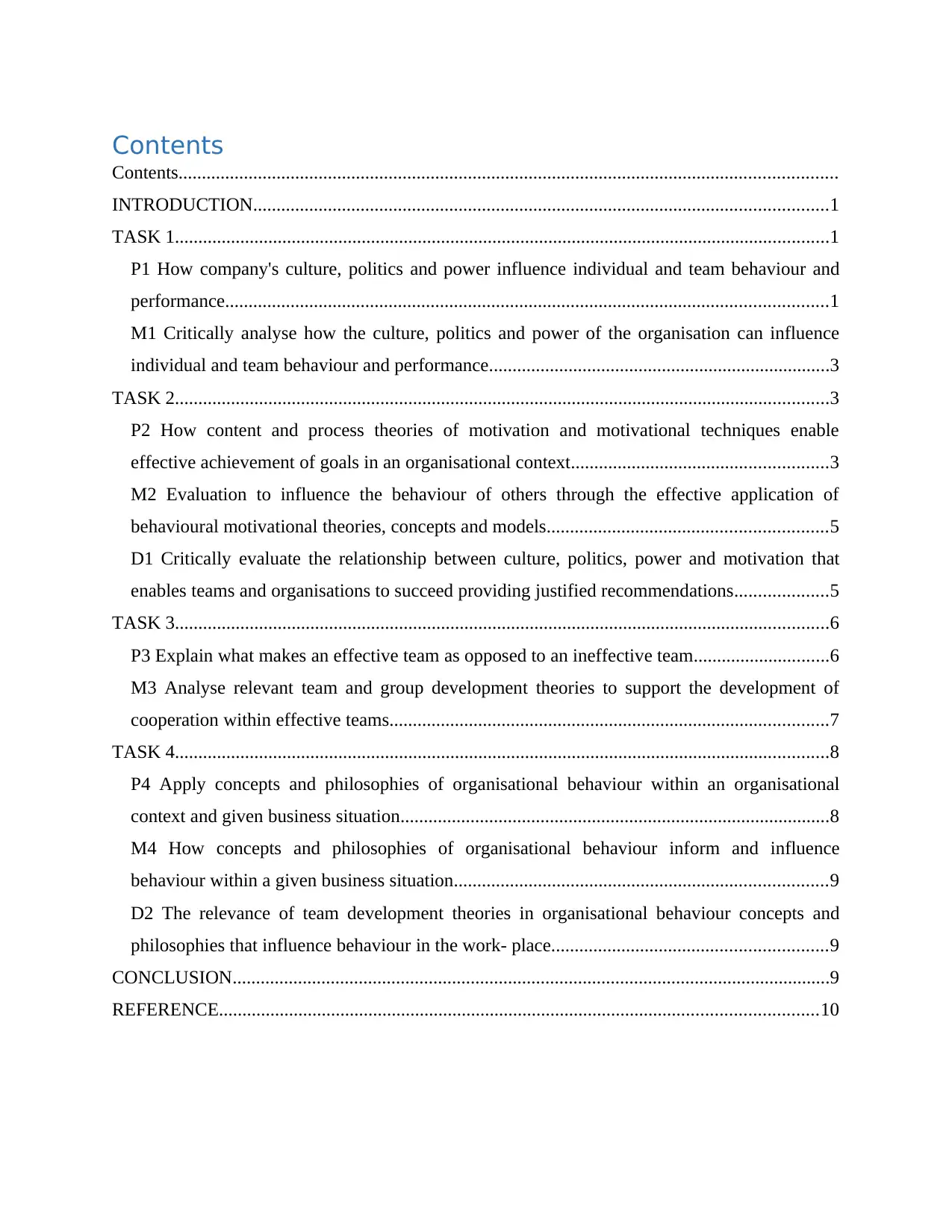
Contents
Contents.............................................................................................................................................
INTRODUCTION...........................................................................................................................1
TASK 1............................................................................................................................................1
P1 How company's culture, politics and power influence individual and team behaviour and
performance.................................................................................................................................1
M1 Critically analyse how the culture, politics and power of the organisation can influence
individual and team behaviour and performance.........................................................................3
TASK 2............................................................................................................................................3
P2 How content and process theories of motivation and motivational techniques enable
effective achievement of goals in an organisational context.......................................................3
M2 Evaluation to influence the behaviour of others through the effective application of
behavioural motivational theories, concepts and models............................................................5
D1 Critically evaluate the relationship between culture, politics, power and motivation that
enables teams and organisations to succeed providing justified recommendations....................5
TASK 3............................................................................................................................................6
P3 Explain what makes an effective team as opposed to an ineffective team.............................6
M3 Analyse relevant team and group development theories to support the development of
cooperation within effective teams..............................................................................................7
TASK 4............................................................................................................................................8
P4 Apply concepts and philosophies of organisational behaviour within an organisational
context and given business situation............................................................................................8
M4 How concepts and philosophies of organisational behaviour inform and influence
behaviour within a given business situation................................................................................9
D2 The relevance of team development theories in organisational behaviour concepts and
philosophies that influence behaviour in the work- place...........................................................9
CONCLUSION................................................................................................................................9
REFERENCE................................................................................................................................10
Contents.............................................................................................................................................
INTRODUCTION...........................................................................................................................1
TASK 1............................................................................................................................................1
P1 How company's culture, politics and power influence individual and team behaviour and
performance.................................................................................................................................1
M1 Critically analyse how the culture, politics and power of the organisation can influence
individual and team behaviour and performance.........................................................................3
TASK 2............................................................................................................................................3
P2 How content and process theories of motivation and motivational techniques enable
effective achievement of goals in an organisational context.......................................................3
M2 Evaluation to influence the behaviour of others through the effective application of
behavioural motivational theories, concepts and models............................................................5
D1 Critically evaluate the relationship between culture, politics, power and motivation that
enables teams and organisations to succeed providing justified recommendations....................5
TASK 3............................................................................................................................................6
P3 Explain what makes an effective team as opposed to an ineffective team.............................6
M3 Analyse relevant team and group development theories to support the development of
cooperation within effective teams..............................................................................................7
TASK 4............................................................................................................................................8
P4 Apply concepts and philosophies of organisational behaviour within an organisational
context and given business situation............................................................................................8
M4 How concepts and philosophies of organisational behaviour inform and influence
behaviour within a given business situation................................................................................9
D2 The relevance of team development theories in organisational behaviour concepts and
philosophies that influence behaviour in the work- place...........................................................9
CONCLUSION................................................................................................................................9
REFERENCE................................................................................................................................10
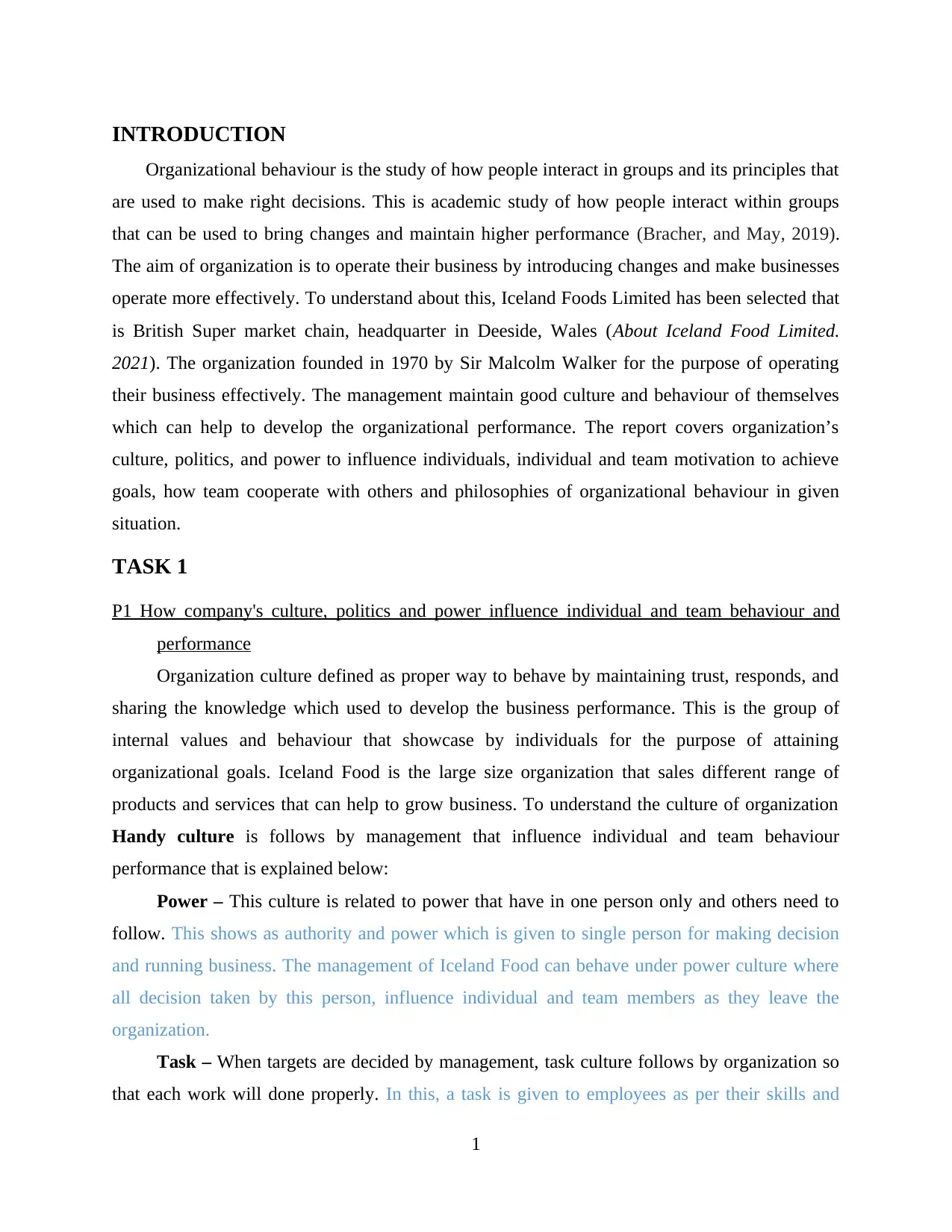
INTRODUCTION
Organizational behaviour is the study of how people interact in groups and its principles that
are used to make right decisions. This is academic study of how people interact within groups
that can be used to bring changes and maintain higher performance (Bracher, and May, 2019).
The aim of organization is to operate their business by introducing changes and make businesses
operate more effectively. To understand about this, Iceland Foods Limited has been selected that
is British Super market chain, headquarter in Deeside, Wales (About Iceland Food Limited.
2021). The organization founded in 1970 by Sir Malcolm Walker for the purpose of operating
their business effectively. The management maintain good culture and behaviour of themselves
which can help to develop the organizational performance. The report covers organization’s
culture, politics, and power to influence individuals, individual and team motivation to achieve
goals, how team cooperate with others and philosophies of organizational behaviour in given
situation.
TASK 1
P1 How company's culture, politics and power influence individual and team behaviour and
performance
Organization culture defined as proper way to behave by maintaining trust, responds, and
sharing the knowledge which used to develop the business performance. This is the group of
internal values and behaviour that showcase by individuals for the purpose of attaining
organizational goals. Iceland Food is the large size organization that sales different range of
products and services that can help to grow business. To understand the culture of organization
Handy culture is follows by management that influence individual and team behaviour
performance that is explained below:
Power – This culture is related to power that have in one person only and others need to
follow. This shows as authority and power which is given to single person for making decision
and running business. The management of Iceland Food can behave under power culture where
all decision taken by this person, influence individual and team members as they leave the
organization.
Task – When targets are decided by management, task culture follows by organization so
that each work will done properly. In this, a task is given to employees as per their skills and
1
Organizational behaviour is the study of how people interact in groups and its principles that
are used to make right decisions. This is academic study of how people interact within groups
that can be used to bring changes and maintain higher performance (Bracher, and May, 2019).
The aim of organization is to operate their business by introducing changes and make businesses
operate more effectively. To understand about this, Iceland Foods Limited has been selected that
is British Super market chain, headquarter in Deeside, Wales (About Iceland Food Limited.
2021). The organization founded in 1970 by Sir Malcolm Walker for the purpose of operating
their business effectively. The management maintain good culture and behaviour of themselves
which can help to develop the organizational performance. The report covers organization’s
culture, politics, and power to influence individuals, individual and team motivation to achieve
goals, how team cooperate with others and philosophies of organizational behaviour in given
situation.
TASK 1
P1 How company's culture, politics and power influence individual and team behaviour and
performance
Organization culture defined as proper way to behave by maintaining trust, responds, and
sharing the knowledge which used to develop the business performance. This is the group of
internal values and behaviour that showcase by individuals for the purpose of attaining
organizational goals. Iceland Food is the large size organization that sales different range of
products and services that can help to grow business. To understand the culture of organization
Handy culture is follows by management that influence individual and team behaviour
performance that is explained below:
Power – This culture is related to power that have in one person only and others need to
follow. This shows as authority and power which is given to single person for making decision
and running business. The management of Iceland Food can behave under power culture where
all decision taken by this person, influence individual and team members as they leave the
organization.
Task – When targets are decided by management, task culture follows by organization so
that each work will done properly. In this, a task is given to employees as per their skills and
1
⊘ This is a preview!⊘
Do you want full access?
Subscribe today to unlock all pages.

Trusted by 1+ million students worldwide
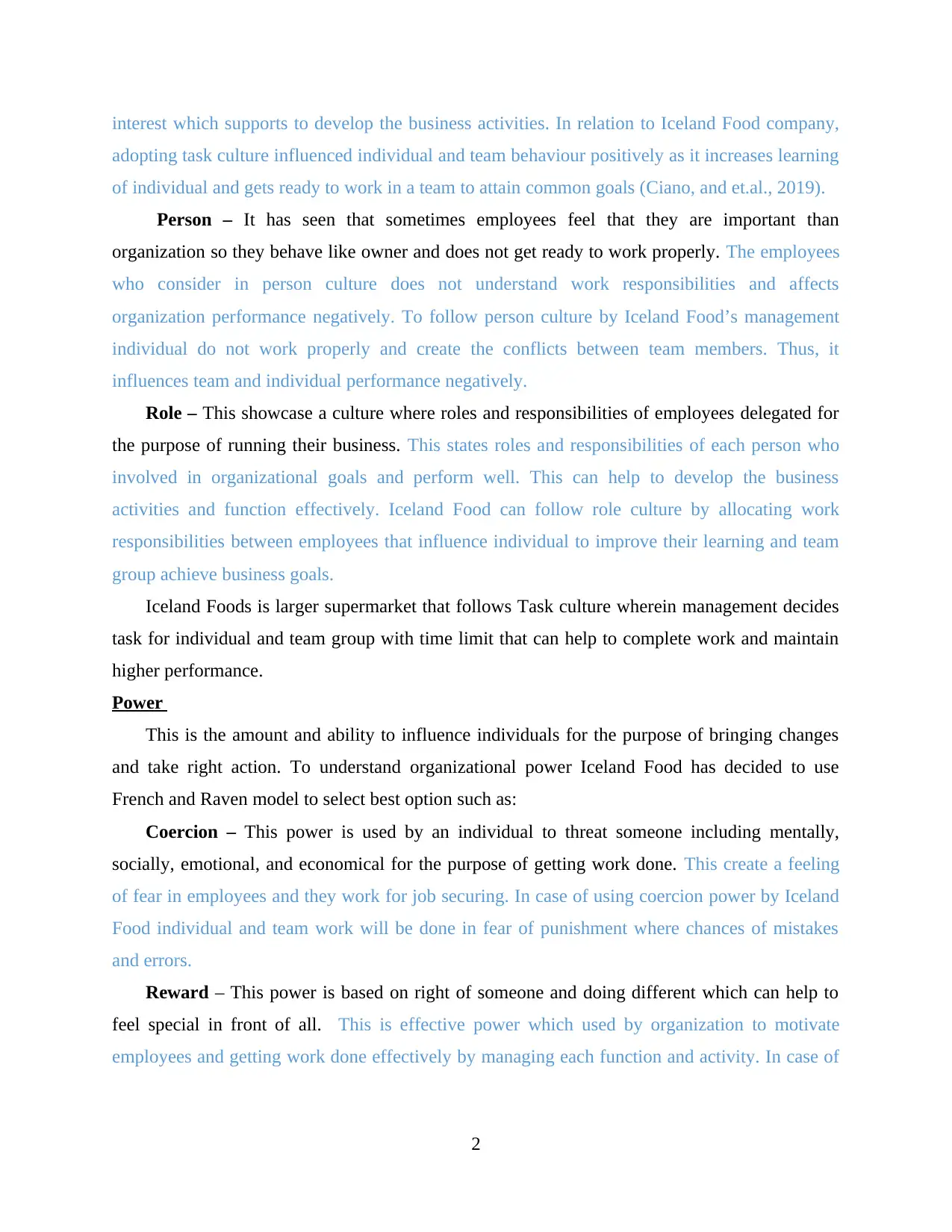
interest which supports to develop the business activities. In relation to Iceland Food company,
adopting task culture influenced individual and team behaviour positively as it increases learning
of individual and gets ready to work in a team to attain common goals (Ciano, and et.al., 2019).
Person – It has seen that sometimes employees feel that they are important than
organization so they behave like owner and does not get ready to work properly. The employees
who consider in person culture does not understand work responsibilities and affects
organization performance negatively. To follow person culture by Iceland Food’s management
individual do not work properly and create the conflicts between team members. Thus, it
influences team and individual performance negatively.
Role – This showcase a culture where roles and responsibilities of employees delegated for
the purpose of running their business. This states roles and responsibilities of each person who
involved in organizational goals and perform well. This can help to develop the business
activities and function effectively. Iceland Food can follow role culture by allocating work
responsibilities between employees that influence individual to improve their learning and team
group achieve business goals.
Iceland Foods is larger supermarket that follows Task culture wherein management decides
task for individual and team group with time limit that can help to complete work and maintain
higher performance.
Power
This is the amount and ability to influence individuals for the purpose of bringing changes
and take right action. To understand organizational power Iceland Food has decided to use
French and Raven model to select best option such as:
Coercion – This power is used by an individual to threat someone including mentally,
socially, emotional, and economical for the purpose of getting work done. This create a feeling
of fear in employees and they work for job securing. In case of using coercion power by Iceland
Food individual and team work will be done in fear of punishment where chances of mistakes
and errors.
Reward – This power is based on right of someone and doing different which can help to
feel special in front of all. This is effective power which used by organization to motivate
employees and getting work done effectively by managing each function and activity. In case of
2
adopting task culture influenced individual and team behaviour positively as it increases learning
of individual and gets ready to work in a team to attain common goals (Ciano, and et.al., 2019).
Person – It has seen that sometimes employees feel that they are important than
organization so they behave like owner and does not get ready to work properly. The employees
who consider in person culture does not understand work responsibilities and affects
organization performance negatively. To follow person culture by Iceland Food’s management
individual do not work properly and create the conflicts between team members. Thus, it
influences team and individual performance negatively.
Role – This showcase a culture where roles and responsibilities of employees delegated for
the purpose of running their business. This states roles and responsibilities of each person who
involved in organizational goals and perform well. This can help to develop the business
activities and function effectively. Iceland Food can follow role culture by allocating work
responsibilities between employees that influence individual to improve their learning and team
group achieve business goals.
Iceland Foods is larger supermarket that follows Task culture wherein management decides
task for individual and team group with time limit that can help to complete work and maintain
higher performance.
Power
This is the amount and ability to influence individuals for the purpose of bringing changes
and take right action. To understand organizational power Iceland Food has decided to use
French and Raven model to select best option such as:
Coercion – This power is used by an individual to threat someone including mentally,
socially, emotional, and economical for the purpose of getting work done. This create a feeling
of fear in employees and they work for job securing. In case of using coercion power by Iceland
Food individual and team work will be done in fear of punishment where chances of mistakes
and errors.
Reward – This power is based on right of someone and doing different which can help to
feel special in front of all. This is effective power which used by organization to motivate
employees and getting work done effectively by managing each function and activity. In case of
2
Paraphrase This Document
Need a fresh take? Get an instant paraphrase of this document with our AI Paraphraser
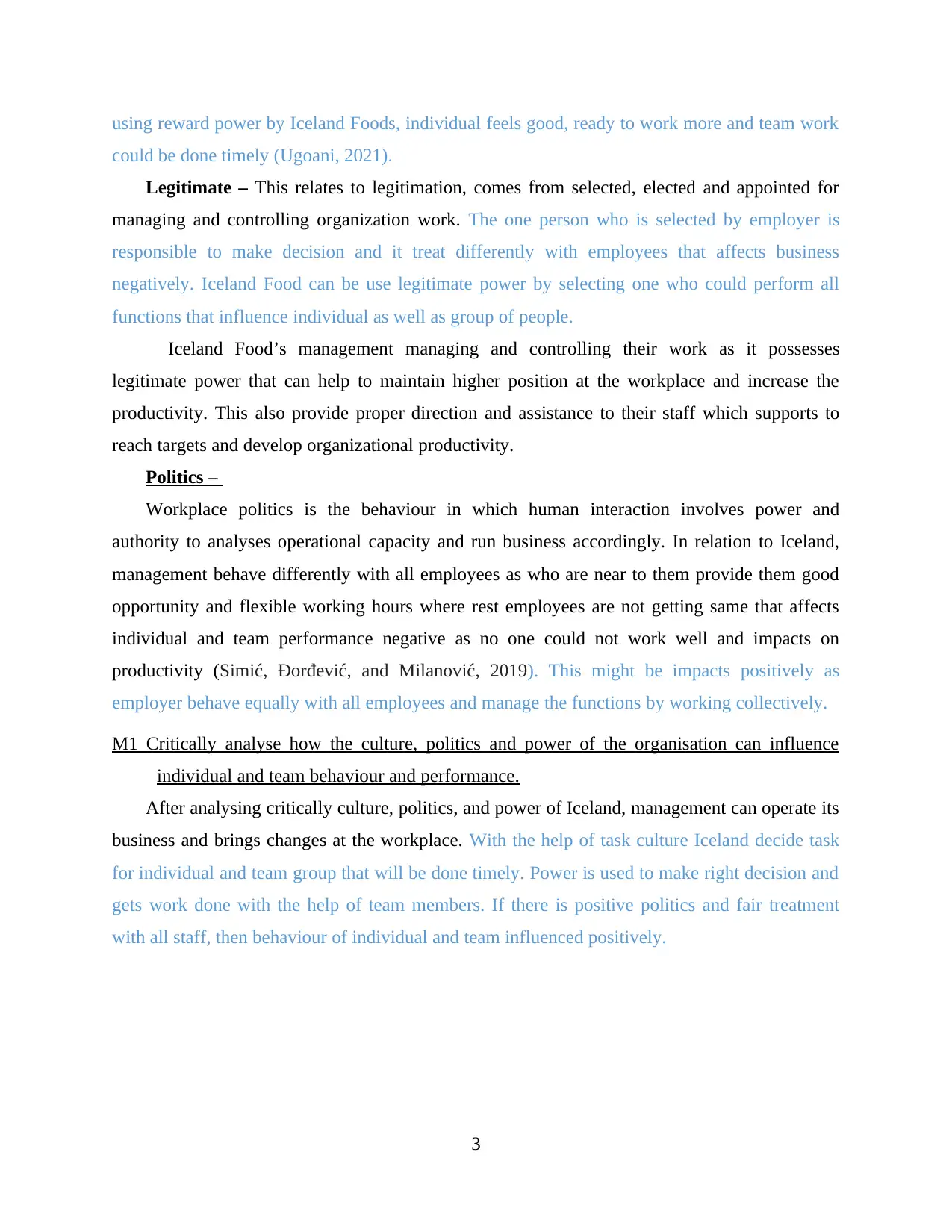
using reward power by Iceland Foods, individual feels good, ready to work more and team work
could be done timely (Ugoani, 2021).
Legitimate – This relates to legitimation, comes from selected, elected and appointed for
managing and controlling organization work. The one person who is selected by employer is
responsible to make decision and it treat differently with employees that affects business
negatively. Iceland Food can be use legitimate power by selecting one who could perform all
functions that influence individual as well as group of people.
Iceland Food’s management managing and controlling their work as it possesses
legitimate power that can help to maintain higher position at the workplace and increase the
productivity. This also provide proper direction and assistance to their staff which supports to
reach targets and develop organizational productivity.
Politics –
Workplace politics is the behaviour in which human interaction involves power and
authority to analyses operational capacity and run business accordingly. In relation to Iceland,
management behave differently with all employees as who are near to them provide them good
opportunity and flexible working hours where rest employees are not getting same that affects
individual and team performance negative as no one could not work well and impacts on
productivity (Simić, Đorđević, and Milanović, 2019). This might be impacts positively as
employer behave equally with all employees and manage the functions by working collectively.
M1 Critically analyse how the culture, politics and power of the organisation can influence
individual and team behaviour and performance.
After analysing critically culture, politics, and power of Iceland, management can operate its
business and brings changes at the workplace. With the help of task culture Iceland decide task
for individual and team group that will be done timely. Power is used to make right decision and
gets work done with the help of team members. If there is positive politics and fair treatment
with all staff, then behaviour of individual and team influenced positively.
3
could be done timely (Ugoani, 2021).
Legitimate – This relates to legitimation, comes from selected, elected and appointed for
managing and controlling organization work. The one person who is selected by employer is
responsible to make decision and it treat differently with employees that affects business
negatively. Iceland Food can be use legitimate power by selecting one who could perform all
functions that influence individual as well as group of people.
Iceland Food’s management managing and controlling their work as it possesses
legitimate power that can help to maintain higher position at the workplace and increase the
productivity. This also provide proper direction and assistance to their staff which supports to
reach targets and develop organizational productivity.
Politics –
Workplace politics is the behaviour in which human interaction involves power and
authority to analyses operational capacity and run business accordingly. In relation to Iceland,
management behave differently with all employees as who are near to them provide them good
opportunity and flexible working hours where rest employees are not getting same that affects
individual and team performance negative as no one could not work well and impacts on
productivity (Simić, Đorđević, and Milanović, 2019). This might be impacts positively as
employer behave equally with all employees and manage the functions by working collectively.
M1 Critically analyse how the culture, politics and power of the organisation can influence
individual and team behaviour and performance.
After analysing critically culture, politics, and power of Iceland, management can operate its
business and brings changes at the workplace. With the help of task culture Iceland decide task
for individual and team group that will be done timely. Power is used to make right decision and
gets work done with the help of team members. If there is positive politics and fair treatment
with all staff, then behaviour of individual and team influenced positively.
3
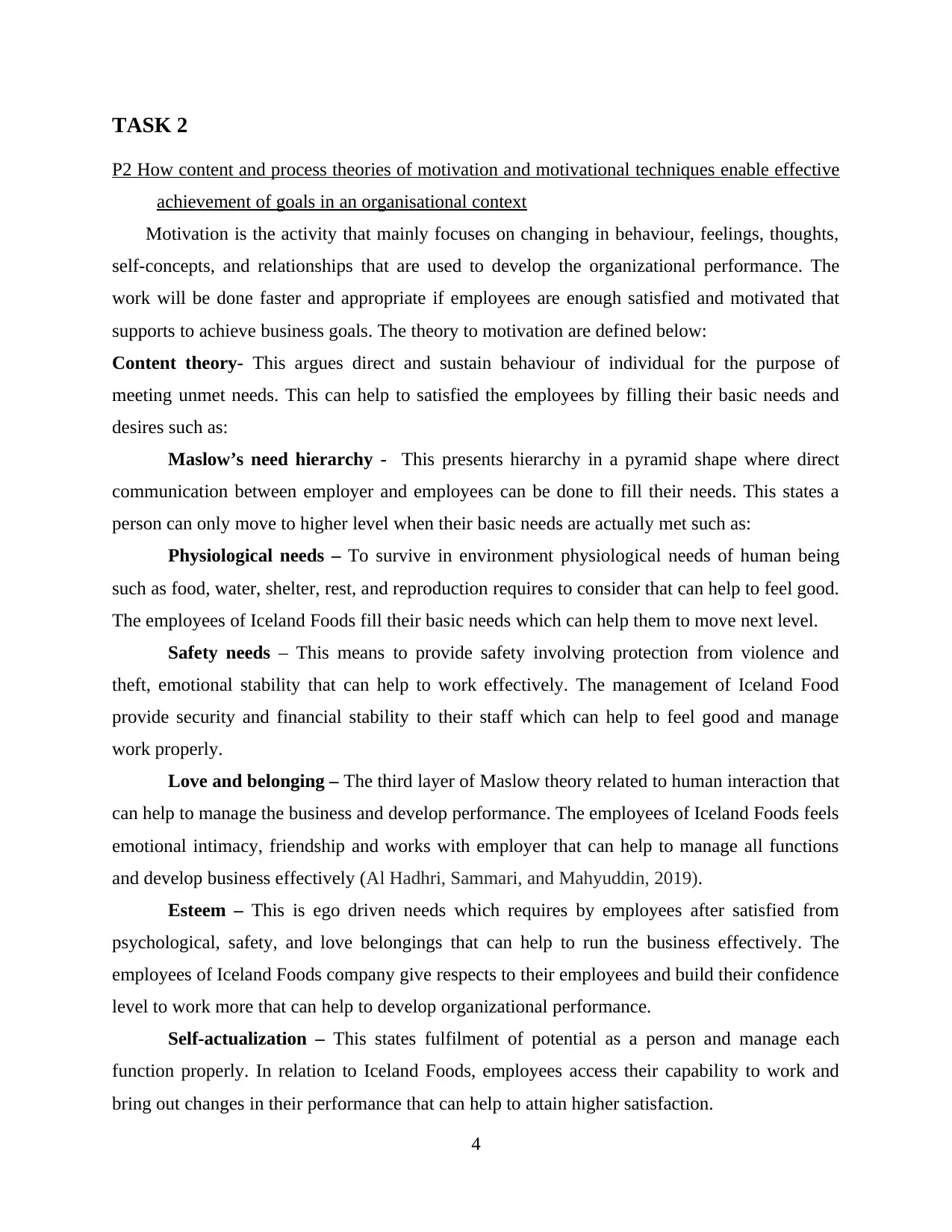
TASK 2
P2 How content and process theories of motivation and motivational techniques enable effective
achievement of goals in an organisational context
Motivation is the activity that mainly focuses on changing in behaviour, feelings, thoughts,
self-concepts, and relationships that are used to develop the organizational performance. The
work will be done faster and appropriate if employees are enough satisfied and motivated that
supports to achieve business goals. The theory to motivation are defined below:
Content theory- This argues direct and sustain behaviour of individual for the purpose of
meeting unmet needs. This can help to satisfied the employees by filling their basic needs and
desires such as:
Maslow’s need hierarchy - This presents hierarchy in a pyramid shape where direct
communication between employer and employees can be done to fill their needs. This states a
person can only move to higher level when their basic needs are actually met such as:
Physiological needs – To survive in environment physiological needs of human being
such as food, water, shelter, rest, and reproduction requires to consider that can help to feel good.
The employees of Iceland Foods fill their basic needs which can help them to move next level.
Safety needs – This means to provide safety involving protection from violence and
theft, emotional stability that can help to work effectively. The management of Iceland Food
provide security and financial stability to their staff which can help to feel good and manage
work properly.
Love and belonging – The third layer of Maslow theory related to human interaction that
can help to manage the business and develop performance. The employees of Iceland Foods feels
emotional intimacy, friendship and works with employer that can help to manage all functions
and develop business effectively (Al Hadhri, Sammari, and Mahyuddin, 2019).
Esteem – This is ego driven needs which requires by employees after satisfied from
psychological, safety, and love belongings that can help to run the business effectively. The
employees of Iceland Foods company give respects to their employees and build their confidence
level to work more that can help to develop organizational performance.
Self-actualization – This states fulfilment of potential as a person and manage each
function properly. In relation to Iceland Foods, employees access their capability to work and
bring out changes in their performance that can help to attain higher satisfaction.
4
P2 How content and process theories of motivation and motivational techniques enable effective
achievement of goals in an organisational context
Motivation is the activity that mainly focuses on changing in behaviour, feelings, thoughts,
self-concepts, and relationships that are used to develop the organizational performance. The
work will be done faster and appropriate if employees are enough satisfied and motivated that
supports to achieve business goals. The theory to motivation are defined below:
Content theory- This argues direct and sustain behaviour of individual for the purpose of
meeting unmet needs. This can help to satisfied the employees by filling their basic needs and
desires such as:
Maslow’s need hierarchy - This presents hierarchy in a pyramid shape where direct
communication between employer and employees can be done to fill their needs. This states a
person can only move to higher level when their basic needs are actually met such as:
Physiological needs – To survive in environment physiological needs of human being
such as food, water, shelter, rest, and reproduction requires to consider that can help to feel good.
The employees of Iceland Foods fill their basic needs which can help them to move next level.
Safety needs – This means to provide safety involving protection from violence and
theft, emotional stability that can help to work effectively. The management of Iceland Food
provide security and financial stability to their staff which can help to feel good and manage
work properly.
Love and belonging – The third layer of Maslow theory related to human interaction that
can help to manage the business and develop performance. The employees of Iceland Foods feels
emotional intimacy, friendship and works with employer that can help to manage all functions
and develop business effectively (Al Hadhri, Sammari, and Mahyuddin, 2019).
Esteem – This is ego driven needs which requires by employees after satisfied from
psychological, safety, and love belongings that can help to run the business effectively. The
employees of Iceland Foods company give respects to their employees and build their confidence
level to work more that can help to develop organizational performance.
Self-actualization – This states fulfilment of potential as a person and manage each
function properly. In relation to Iceland Foods, employees access their capability to work and
bring out changes in their performance that can help to attain higher satisfaction.
4
⊘ This is a preview!⊘
Do you want full access?
Subscribe today to unlock all pages.

Trusted by 1+ million students worldwide
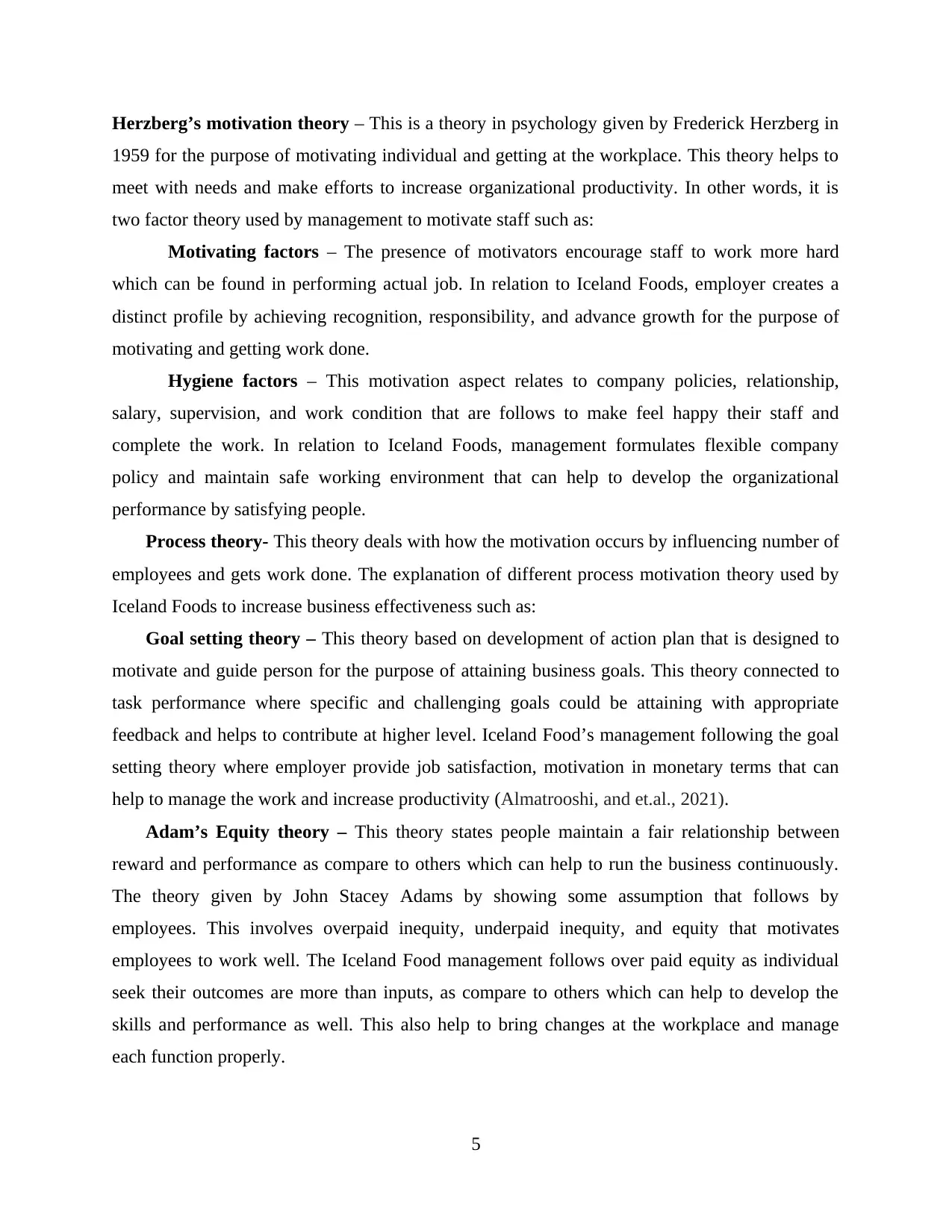
Herzberg’s motivation theory – This is a theory in psychology given by Frederick Herzberg in
1959 for the purpose of motivating individual and getting at the workplace. This theory helps to
meet with needs and make efforts to increase organizational productivity. In other words, it is
two factor theory used by management to motivate staff such as:
Motivating factors – The presence of motivators encourage staff to work more hard
which can be found in performing actual job. In relation to Iceland Foods, employer creates a
distinct profile by achieving recognition, responsibility, and advance growth for the purpose of
motivating and getting work done.
Hygiene factors – This motivation aspect relates to company policies, relationship,
salary, supervision, and work condition that are follows to make feel happy their staff and
complete the work. In relation to Iceland Foods, management formulates flexible company
policy and maintain safe working environment that can help to develop the organizational
performance by satisfying people.
Process theory- This theory deals with how the motivation occurs by influencing number of
employees and gets work done. The explanation of different process motivation theory used by
Iceland Foods to increase business effectiveness such as:
Goal setting theory – This theory based on development of action plan that is designed to
motivate and guide person for the purpose of attaining business goals. This theory connected to
task performance where specific and challenging goals could be attaining with appropriate
feedback and helps to contribute at higher level. Iceland Food’s management following the goal
setting theory where employer provide job satisfaction, motivation in monetary terms that can
help to manage the work and increase productivity (Almatrooshi, and et.al., 2021).
Adam’s Equity theory – This theory states people maintain a fair relationship between
reward and performance as compare to others which can help to run the business continuously.
The theory given by John Stacey Adams by showing some assumption that follows by
employees. This involves overpaid inequity, underpaid inequity, and equity that motivates
employees to work well. The Iceland Food management follows over paid equity as individual
seek their outcomes are more than inputs, as compare to others which can help to develop the
skills and performance as well. This also help to bring changes at the workplace and manage
each function properly.
5
1959 for the purpose of motivating individual and getting at the workplace. This theory helps to
meet with needs and make efforts to increase organizational productivity. In other words, it is
two factor theory used by management to motivate staff such as:
Motivating factors – The presence of motivators encourage staff to work more hard
which can be found in performing actual job. In relation to Iceland Foods, employer creates a
distinct profile by achieving recognition, responsibility, and advance growth for the purpose of
motivating and getting work done.
Hygiene factors – This motivation aspect relates to company policies, relationship,
salary, supervision, and work condition that are follows to make feel happy their staff and
complete the work. In relation to Iceland Foods, management formulates flexible company
policy and maintain safe working environment that can help to develop the organizational
performance by satisfying people.
Process theory- This theory deals with how the motivation occurs by influencing number of
employees and gets work done. The explanation of different process motivation theory used by
Iceland Foods to increase business effectiveness such as:
Goal setting theory – This theory based on development of action plan that is designed to
motivate and guide person for the purpose of attaining business goals. This theory connected to
task performance where specific and challenging goals could be attaining with appropriate
feedback and helps to contribute at higher level. Iceland Food’s management following the goal
setting theory where employer provide job satisfaction, motivation in monetary terms that can
help to manage the work and increase productivity (Almatrooshi, and et.al., 2021).
Adam’s Equity theory – This theory states people maintain a fair relationship between
reward and performance as compare to others which can help to run the business continuously.
The theory given by John Stacey Adams by showing some assumption that follows by
employees. This involves overpaid inequity, underpaid inequity, and equity that motivates
employees to work well. The Iceland Food management follows over paid equity as individual
seek their outcomes are more than inputs, as compare to others which can help to develop the
skills and performance as well. This also help to bring changes at the workplace and manage
each function properly.
5
Paraphrase This Document
Need a fresh take? Get an instant paraphrase of this document with our AI Paraphraser
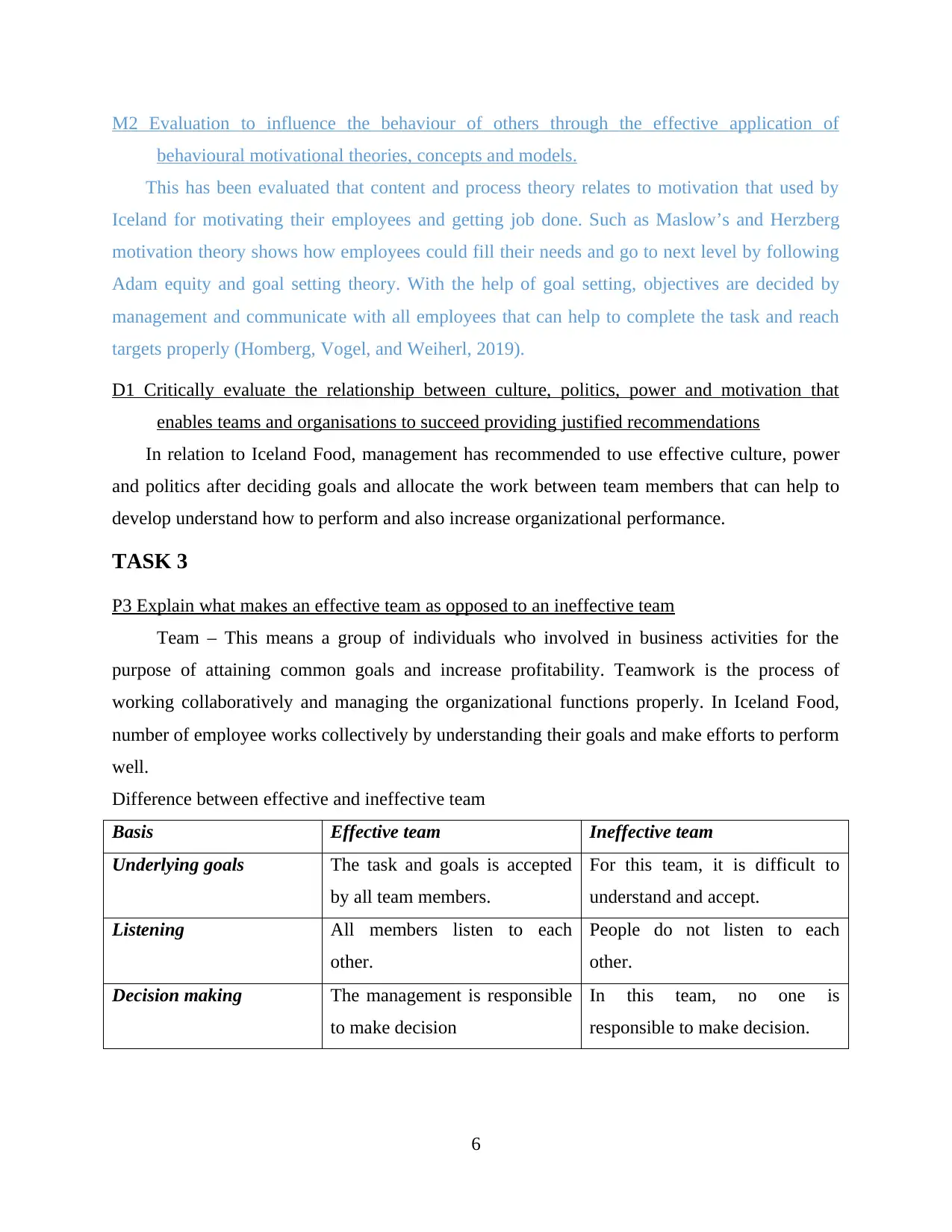
M2 Evaluation to influence the behaviour of others through the effective application of
behavioural motivational theories, concepts and models.
This has been evaluated that content and process theory relates to motivation that used by
Iceland for motivating their employees and getting job done. Such as Maslow’s and Herzberg
motivation theory shows how employees could fill their needs and go to next level by following
Adam equity and goal setting theory. With the help of goal setting, objectives are decided by
management and communicate with all employees that can help to complete the task and reach
targets properly (Homberg, Vogel, and Weiherl, 2019).
D1 Critically evaluate the relationship between culture, politics, power and motivation that
enables teams and organisations to succeed providing justified recommendations
In relation to Iceland Food, management has recommended to use effective culture, power
and politics after deciding goals and allocate the work between team members that can help to
develop understand how to perform and also increase organizational performance.
TASK 3
P3 Explain what makes an effective team as opposed to an ineffective team
Team – This means a group of individuals who involved in business activities for the
purpose of attaining common goals and increase profitability. Teamwork is the process of
working collaboratively and managing the organizational functions properly. In Iceland Food,
number of employee works collectively by understanding their goals and make efforts to perform
well.
Difference between effective and ineffective team
Basis Effective team Ineffective team
Underlying goals The task and goals is accepted
by all team members.
For this team, it is difficult to
understand and accept.
Listening All members listen to each
other.
People do not listen to each
other.
Decision making The management is responsible
to make decision
In this team, no one is
responsible to make decision.
6
behavioural motivational theories, concepts and models.
This has been evaluated that content and process theory relates to motivation that used by
Iceland for motivating their employees and getting job done. Such as Maslow’s and Herzberg
motivation theory shows how employees could fill their needs and go to next level by following
Adam equity and goal setting theory. With the help of goal setting, objectives are decided by
management and communicate with all employees that can help to complete the task and reach
targets properly (Homberg, Vogel, and Weiherl, 2019).
D1 Critically evaluate the relationship between culture, politics, power and motivation that
enables teams and organisations to succeed providing justified recommendations
In relation to Iceland Food, management has recommended to use effective culture, power
and politics after deciding goals and allocate the work between team members that can help to
develop understand how to perform and also increase organizational performance.
TASK 3
P3 Explain what makes an effective team as opposed to an ineffective team
Team – This means a group of individuals who involved in business activities for the
purpose of attaining common goals and increase profitability. Teamwork is the process of
working collaboratively and managing the organizational functions properly. In Iceland Food,
number of employee works collectively by understanding their goals and make efforts to perform
well.
Difference between effective and ineffective team
Basis Effective team Ineffective team
Underlying goals The task and goals is accepted
by all team members.
For this team, it is difficult to
understand and accept.
Listening All members listen to each
other.
People do not listen to each
other.
Decision making The management is responsible
to make decision
In this team, no one is
responsible to make decision.
6
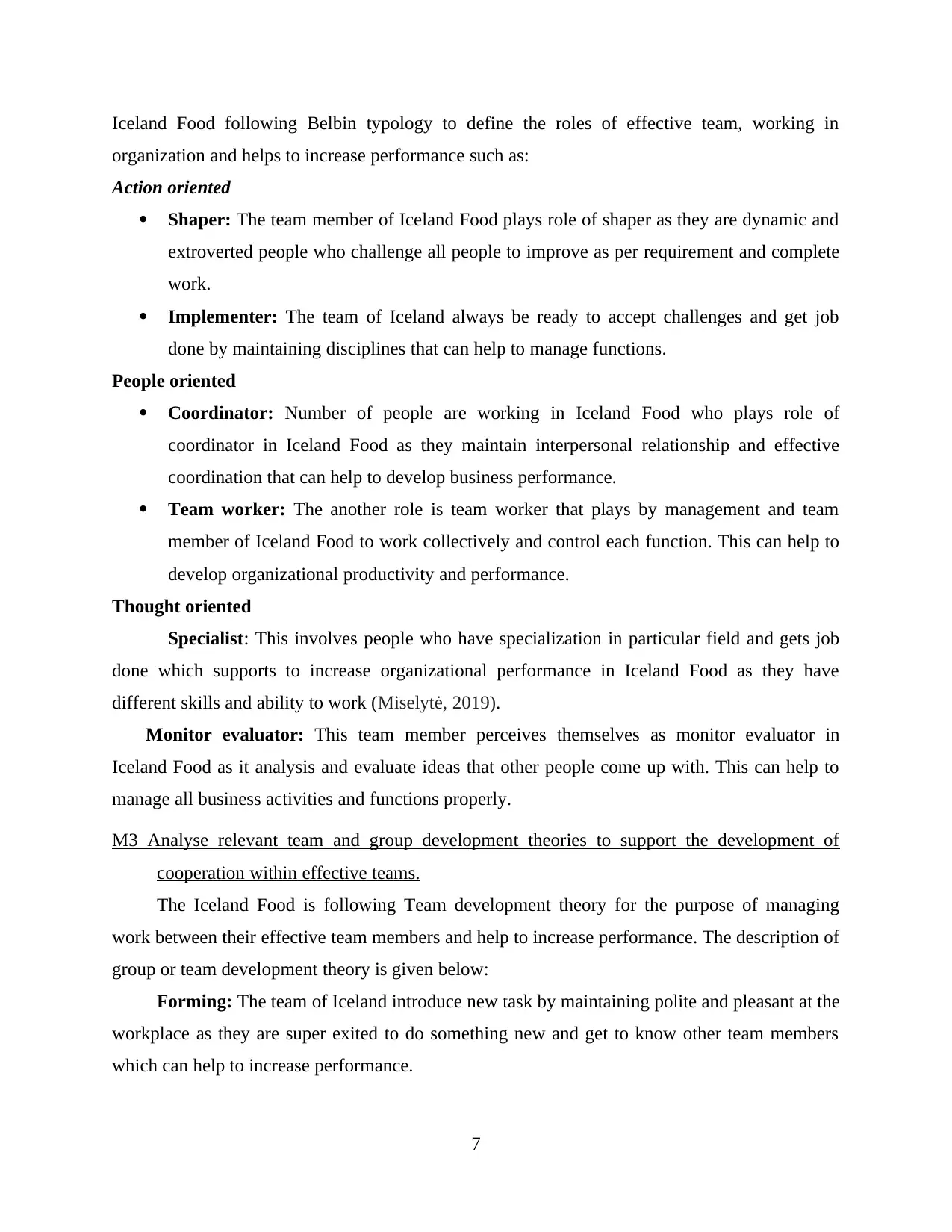
Iceland Food following Belbin typology to define the roles of effective team, working in
organization and helps to increase performance such as:
Action oriented
Shaper: The team member of Iceland Food plays role of shaper as they are dynamic and
extroverted people who challenge all people to improve as per requirement and complete
work.
Implementer: The team of Iceland always be ready to accept challenges and get job
done by maintaining disciplines that can help to manage functions.
People oriented
Coordinator: Number of people are working in Iceland Food who plays role of
coordinator in Iceland Food as they maintain interpersonal relationship and effective
coordination that can help to develop business performance.
Team worker: The another role is team worker that plays by management and team
member of Iceland Food to work collectively and control each function. This can help to
develop organizational productivity and performance.
Thought oriented
Specialist: This involves people who have specialization in particular field and gets job
done which supports to increase organizational performance in Iceland Food as they have
different skills and ability to work (Miselytė, 2019).
Monitor evaluator: This team member perceives themselves as monitor evaluator in
Iceland Food as it analysis and evaluate ideas that other people come up with. This can help to
manage all business activities and functions properly.
M3 Analyse relevant team and group development theories to support the development of
cooperation within effective teams.
The Iceland Food is following Team development theory for the purpose of managing
work between their effective team members and help to increase performance. The description of
group or team development theory is given below:
Forming: The team of Iceland introduce new task by maintaining polite and pleasant at the
workplace as they are super exited to do something new and get to know other team members
which can help to increase performance.
7
organization and helps to increase performance such as:
Action oriented
Shaper: The team member of Iceland Food plays role of shaper as they are dynamic and
extroverted people who challenge all people to improve as per requirement and complete
work.
Implementer: The team of Iceland always be ready to accept challenges and get job
done by maintaining disciplines that can help to manage functions.
People oriented
Coordinator: Number of people are working in Iceland Food who plays role of
coordinator in Iceland Food as they maintain interpersonal relationship and effective
coordination that can help to develop business performance.
Team worker: The another role is team worker that plays by management and team
member of Iceland Food to work collectively and control each function. This can help to
develop organizational productivity and performance.
Thought oriented
Specialist: This involves people who have specialization in particular field and gets job
done which supports to increase organizational performance in Iceland Food as they have
different skills and ability to work (Miselytė, 2019).
Monitor evaluator: This team member perceives themselves as monitor evaluator in
Iceland Food as it analysis and evaluate ideas that other people come up with. This can help to
manage all business activities and functions properly.
M3 Analyse relevant team and group development theories to support the development of
cooperation within effective teams.
The Iceland Food is following Team development theory for the purpose of managing
work between their effective team members and help to increase performance. The description of
group or team development theory is given below:
Forming: The team of Iceland introduce new task by maintaining polite and pleasant at the
workplace as they are super exited to do something new and get to know other team members
which can help to increase performance.
7
⊘ This is a preview!⊘
Do you want full access?
Subscribe today to unlock all pages.

Trusted by 1+ million students worldwide
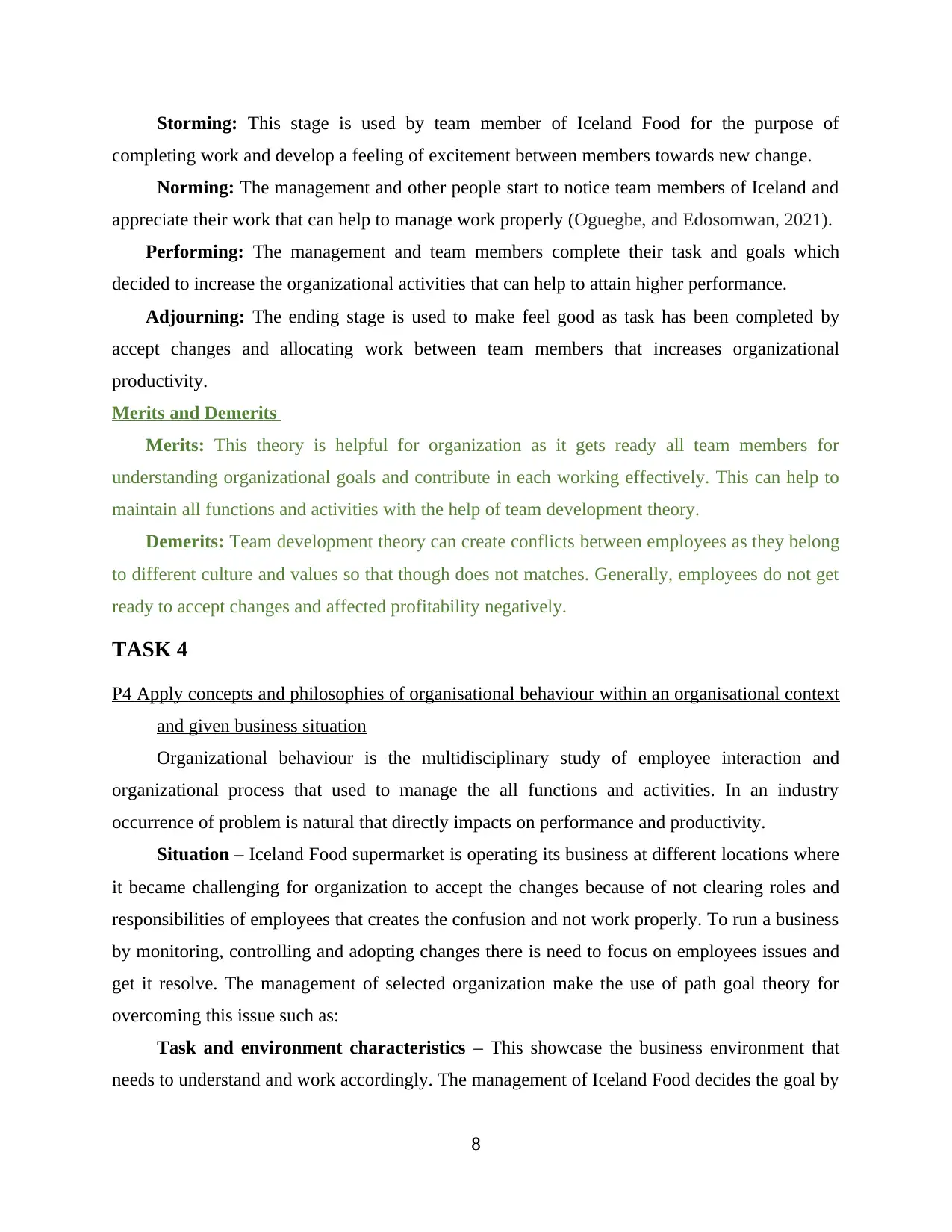
Storming: This stage is used by team member of Iceland Food for the purpose of
completing work and develop a feeling of excitement between members towards new change.
Norming: The management and other people start to notice team members of Iceland and
appreciate their work that can help to manage work properly (Oguegbe, and Edosomwan, 2021).
Performing: The management and team members complete their task and goals which
decided to increase the organizational activities that can help to attain higher performance.
Adjourning: The ending stage is used to make feel good as task has been completed by
accept changes and allocating work between team members that increases organizational
productivity.
Merits and Demerits
Merits: This theory is helpful for organization as it gets ready all team members for
understanding organizational goals and contribute in each working effectively. This can help to
maintain all functions and activities with the help of team development theory.
Demerits: Team development theory can create conflicts between employees as they belong
to different culture and values so that though does not matches. Generally, employees do not get
ready to accept changes and affected profitability negatively.
TASK 4
P4 Apply concepts and philosophies of organisational behaviour within an organisational context
and given business situation
Organizational behaviour is the multidisciplinary study of employee interaction and
organizational process that used to manage the all functions and activities. In an industry
occurrence of problem is natural that directly impacts on performance and productivity.
Situation – Iceland Food supermarket is operating its business at different locations where
it became challenging for organization to accept the changes because of not clearing roles and
responsibilities of employees that creates the confusion and not work properly. To run a business
by monitoring, controlling and adopting changes there is need to focus on employees issues and
get it resolve. The management of selected organization make the use of path goal theory for
overcoming this issue such as:
Task and environment characteristics – This showcase the business environment that
needs to understand and work accordingly. The management of Iceland Food decides the goal by
8
completing work and develop a feeling of excitement between members towards new change.
Norming: The management and other people start to notice team members of Iceland and
appreciate their work that can help to manage work properly (Oguegbe, and Edosomwan, 2021).
Performing: The management and team members complete their task and goals which
decided to increase the organizational activities that can help to attain higher performance.
Adjourning: The ending stage is used to make feel good as task has been completed by
accept changes and allocating work between team members that increases organizational
productivity.
Merits and Demerits
Merits: This theory is helpful for organization as it gets ready all team members for
understanding organizational goals and contribute in each working effectively. This can help to
maintain all functions and activities with the help of team development theory.
Demerits: Team development theory can create conflicts between employees as they belong
to different culture and values so that though does not matches. Generally, employees do not get
ready to accept changes and affected profitability negatively.
TASK 4
P4 Apply concepts and philosophies of organisational behaviour within an organisational context
and given business situation
Organizational behaviour is the multidisciplinary study of employee interaction and
organizational process that used to manage the all functions and activities. In an industry
occurrence of problem is natural that directly impacts on performance and productivity.
Situation – Iceland Food supermarket is operating its business at different locations where
it became challenging for organization to accept the changes because of not clearing roles and
responsibilities of employees that creates the confusion and not work properly. To run a business
by monitoring, controlling and adopting changes there is need to focus on employees issues and
get it resolve. The management of selected organization make the use of path goal theory for
overcoming this issue such as:
Task and environment characteristics – This showcase the business environment that
needs to understand and work accordingly. The management of Iceland Food decides the goal by
8
Paraphrase This Document
Need a fresh take? Get an instant paraphrase of this document with our AI Paraphraser
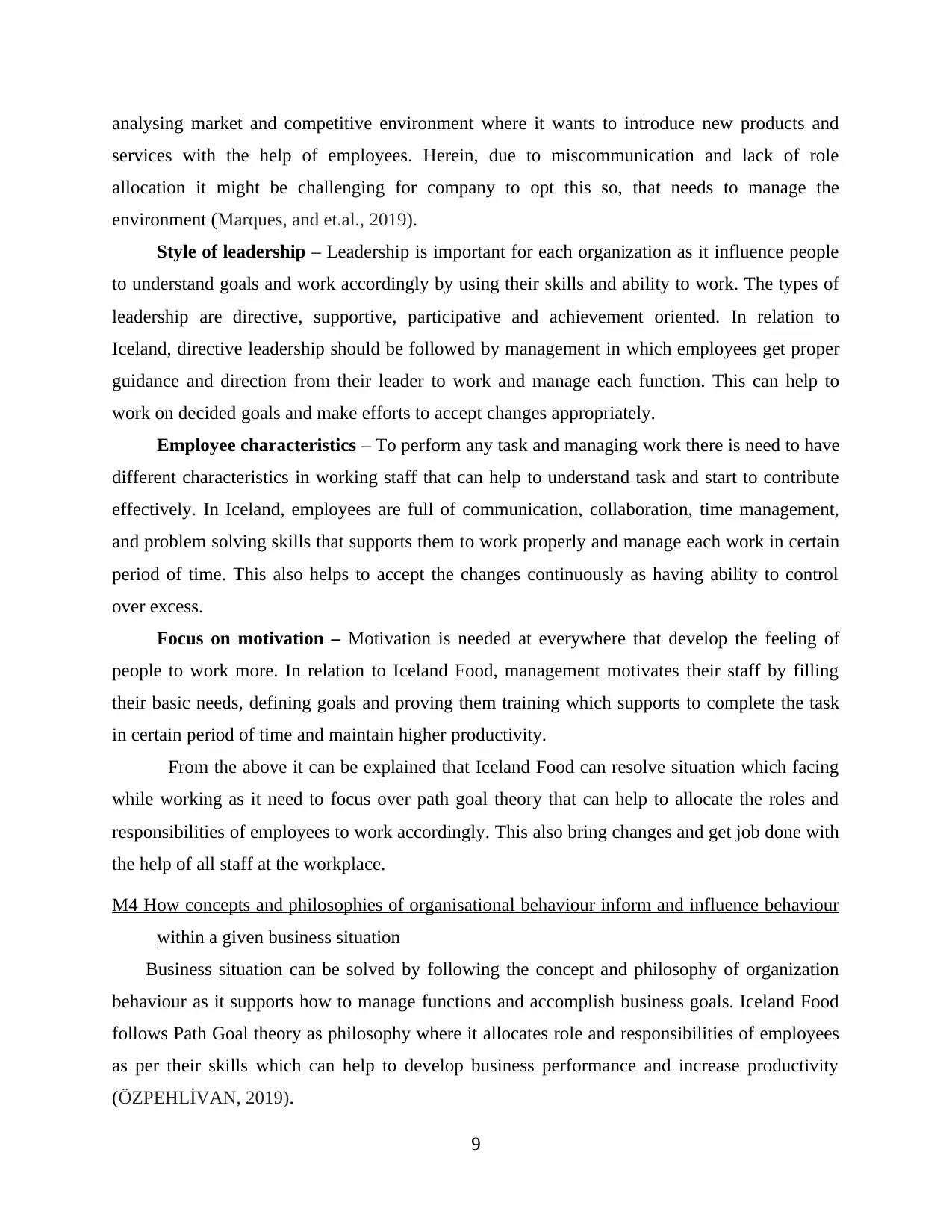
analysing market and competitive environment where it wants to introduce new products and
services with the help of employees. Herein, due to miscommunication and lack of role
allocation it might be challenging for company to opt this so, that needs to manage the
environment (Marques, and et.al., 2019).
Style of leadership – Leadership is important for each organization as it influence people
to understand goals and work accordingly by using their skills and ability to work. The types of
leadership are directive, supportive, participative and achievement oriented. In relation to
Iceland, directive leadership should be followed by management in which employees get proper
guidance and direction from their leader to work and manage each function. This can help to
work on decided goals and make efforts to accept changes appropriately.
Employee characteristics – To perform any task and managing work there is need to have
different characteristics in working staff that can help to understand task and start to contribute
effectively. In Iceland, employees are full of communication, collaboration, time management,
and problem solving skills that supports them to work properly and manage each work in certain
period of time. This also helps to accept the changes continuously as having ability to control
over excess.
Focus on motivation – Motivation is needed at everywhere that develop the feeling of
people to work more. In relation to Iceland Food, management motivates their staff by filling
their basic needs, defining goals and proving them training which supports to complete the task
in certain period of time and maintain higher productivity.
From the above it can be explained that Iceland Food can resolve situation which facing
while working as it need to focus over path goal theory that can help to allocate the roles and
responsibilities of employees to work accordingly. This also bring changes and get job done with
the help of all staff at the workplace.
M4 How concepts and philosophies of organisational behaviour inform and influence behaviour
within a given business situation
Business situation can be solved by following the concept and philosophy of organization
behaviour as it supports how to manage functions and accomplish business goals. Iceland Food
follows Path Goal theory as philosophy where it allocates role and responsibilities of employees
as per their skills which can help to develop business performance and increase productivity
(ÖZPEHLİVAN, 2019).
9
services with the help of employees. Herein, due to miscommunication and lack of role
allocation it might be challenging for company to opt this so, that needs to manage the
environment (Marques, and et.al., 2019).
Style of leadership – Leadership is important for each organization as it influence people
to understand goals and work accordingly by using their skills and ability to work. The types of
leadership are directive, supportive, participative and achievement oriented. In relation to
Iceland, directive leadership should be followed by management in which employees get proper
guidance and direction from their leader to work and manage each function. This can help to
work on decided goals and make efforts to accept changes appropriately.
Employee characteristics – To perform any task and managing work there is need to have
different characteristics in working staff that can help to understand task and start to contribute
effectively. In Iceland, employees are full of communication, collaboration, time management,
and problem solving skills that supports them to work properly and manage each work in certain
period of time. This also helps to accept the changes continuously as having ability to control
over excess.
Focus on motivation – Motivation is needed at everywhere that develop the feeling of
people to work more. In relation to Iceland Food, management motivates their staff by filling
their basic needs, defining goals and proving them training which supports to complete the task
in certain period of time and maintain higher productivity.
From the above it can be explained that Iceland Food can resolve situation which facing
while working as it need to focus over path goal theory that can help to allocate the roles and
responsibilities of employees to work accordingly. This also bring changes and get job done with
the help of all staff at the workplace.
M4 How concepts and philosophies of organisational behaviour inform and influence behaviour
within a given business situation
Business situation can be solved by following the concept and philosophy of organization
behaviour as it supports how to manage functions and accomplish business goals. Iceland Food
follows Path Goal theory as philosophy where it allocates role and responsibilities of employees
as per their skills which can help to develop business performance and increase productivity
(ÖZPEHLİVAN, 2019).
9
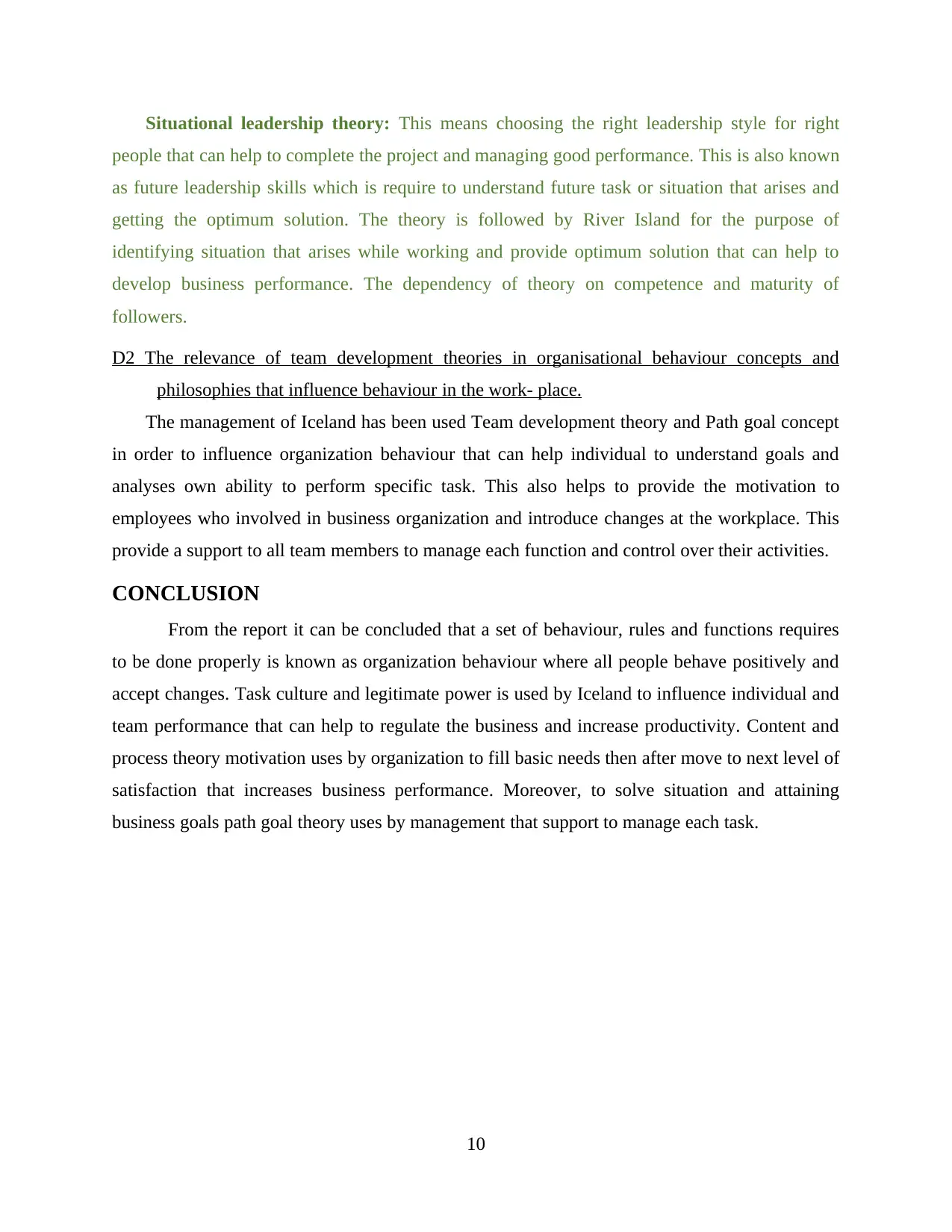
Situational leadership theory: This means choosing the right leadership style for right
people that can help to complete the project and managing good performance. This is also known
as future leadership skills which is require to understand future task or situation that arises and
getting the optimum solution. The theory is followed by River Island for the purpose of
identifying situation that arises while working and provide optimum solution that can help to
develop business performance. The dependency of theory on competence and maturity of
followers.
D2 The relevance of team development theories in organisational behaviour concepts and
philosophies that influence behaviour in the work- place.
The management of Iceland has been used Team development theory and Path goal concept
in order to influence organization behaviour that can help individual to understand goals and
analyses own ability to perform specific task. This also helps to provide the motivation to
employees who involved in business organization and introduce changes at the workplace. This
provide a support to all team members to manage each function and control over their activities.
CONCLUSION
From the report it can be concluded that a set of behaviour, rules and functions requires
to be done properly is known as organization behaviour where all people behave positively and
accept changes. Task culture and legitimate power is used by Iceland to influence individual and
team performance that can help to regulate the business and increase productivity. Content and
process theory motivation uses by organization to fill basic needs then after move to next level of
satisfaction that increases business performance. Moreover, to solve situation and attaining
business goals path goal theory uses by management that support to manage each task.
10
people that can help to complete the project and managing good performance. This is also known
as future leadership skills which is require to understand future task or situation that arises and
getting the optimum solution. The theory is followed by River Island for the purpose of
identifying situation that arises while working and provide optimum solution that can help to
develop business performance. The dependency of theory on competence and maturity of
followers.
D2 The relevance of team development theories in organisational behaviour concepts and
philosophies that influence behaviour in the work- place.
The management of Iceland has been used Team development theory and Path goal concept
in order to influence organization behaviour that can help individual to understand goals and
analyses own ability to perform specific task. This also helps to provide the motivation to
employees who involved in business organization and introduce changes at the workplace. This
provide a support to all team members to manage each function and control over their activities.
CONCLUSION
From the report it can be concluded that a set of behaviour, rules and functions requires
to be done properly is known as organization behaviour where all people behave positively and
accept changes. Task culture and legitimate power is used by Iceland to influence individual and
team performance that can help to regulate the business and increase productivity. Content and
process theory motivation uses by organization to fill basic needs then after move to next level of
satisfaction that increases business performance. Moreover, to solve situation and attaining
business goals path goal theory uses by management that support to manage each task.
10
⊘ This is a preview!⊘
Do you want full access?
Subscribe today to unlock all pages.

Trusted by 1+ million students worldwide
1 out of 13
Related Documents
Your All-in-One AI-Powered Toolkit for Academic Success.
+13062052269
info@desklib.com
Available 24*7 on WhatsApp / Email
![[object Object]](/_next/static/media/star-bottom.7253800d.svg)
Unlock your academic potential
Copyright © 2020–2026 A2Z Services. All Rights Reserved. Developed and managed by ZUCOL.

